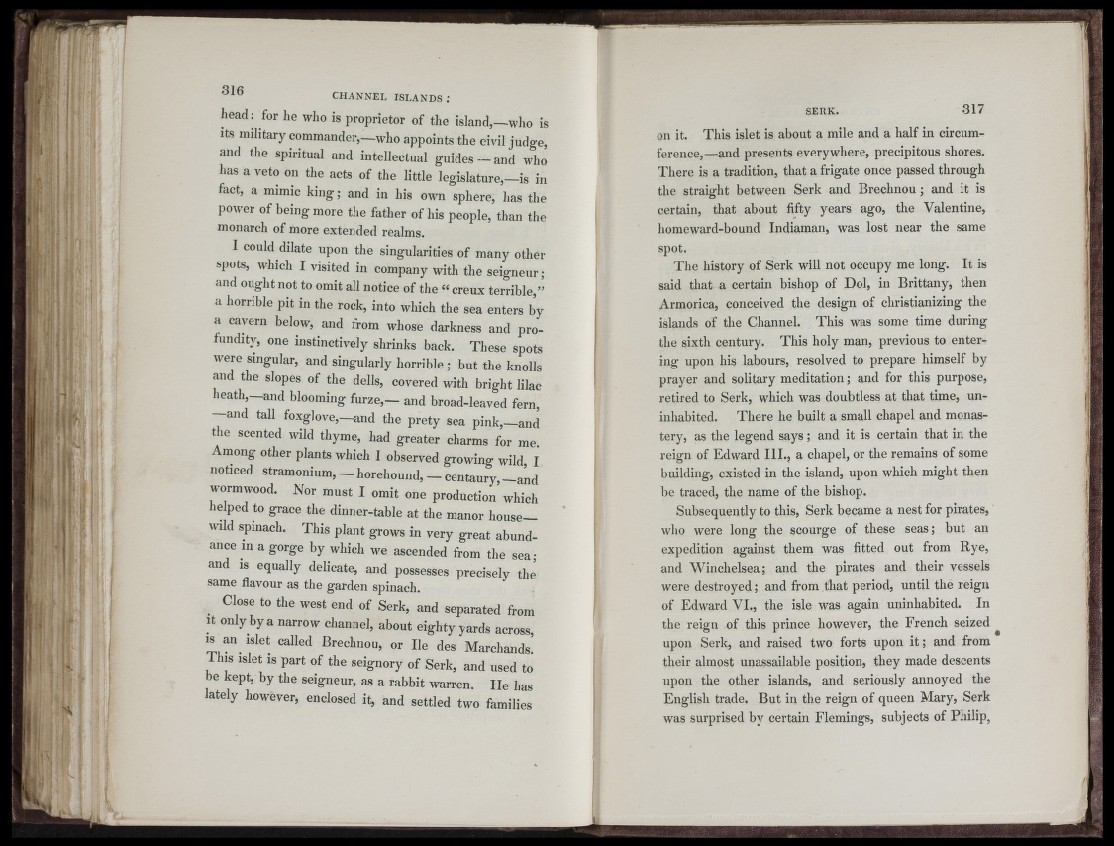
it
i I m: ;
■
A
)
CHANNEL i s l a n d s ;
head; for he who is proprietor of the island,—who is
Its military commander,—who appoints the civil judge,
and the spiritual and intellectual g u id e s - a n d who
has a veto on the acts of the little legislature,—is in
fact, a mimic king; and in his own sphere, l.as the
power of being more the father of his people, than the
monarch of more extended realms.
I could dilate upon the singularities of many other
spots, which I visited in company with the seigneur;
and ought not to omit all notice of the “ creux terrible,”
a horrible pit in the rock, into which the sea enters by
a cavern below, and from whose darkness and profundity,
one instinctively shrinks back. These spots
were singular, and singularly horrible ; but the knolls
and the slopes of the dells, covered with bright lilac
heath,—and blooming furze,— and broad-leaved fern,
—and tall foxglove,—and the prety sea pink,—and
the scented wild thyme, had greater charms for me
Among other plants which I observed growing wild I
noticed stramonium, - horehound, - centaury, - a n d
wormwood. Nor must I omit one production which
hdped to grace the dinner-table at the manor h o u s e -
wild spinach. This plant grows in very great abundance
in a gorge by which we ascended from the sea;
and is equally delicate, and possesses precisely the
same flavour as the garden spinach.
^ Close to the west end of Serk, and separated from
It only by a narrow channel, about eighty yards across,
’I »>• He des Marchands.
Ihis islet IS part of the seignory of Serb, and used to
be kept, by the seigneur, as a rabbit warren. He has
lately however, enclosed it^ and settled two families
SERK. 317
on it. This islet is about a mile and a half in circumference,—
and presents everywhere, precipitous shores.
There is a tradition, that a frigate once passed through
the straight between Serk and Brechnou ; and it is
certain, that about fifty years ago, the Valentine,
homeward-bound Indiaman, was lost near the same
spot.
The history of Serk will not occupy me long. It is
said that a certain bishop of Dol, in Brittany, then
Armorica, conceived the design of christianizing the
islands of the Channel. This was some time during
the sixth century. This holy man, previous to entering
upon his labours, resolved to prepare himself by
prayer and solitary meditation; and for this purpose,
retired to Serk, whicli was doubtless at that time, uninhabited.
There he built a small chapel and monastery,
as the legend says; and it is certain that in the
reign of Edward III., a chapel, or the remains of some
building, existed in the island, upon which might then
be traced, the name of the bishop.
Subsequently to this, Serk became a nest for pirates,
who were long the scourge of these seas; hut an
expedition against them was fitted out from Rye,
and Winchelsea; and the pirates and their vessels
were destroyed; and from that period, until the reign
of Edward VI., the isle was again uninhabited. In
the reign of this prince however, the French seized ^
upon Serk, and raised two forts upon it; and from
their almost unassailable position, they made descents
upon the other islands, and seriously annoyed the
English trade. But in the reign of queen Mary, Serk
was surprised by certain Flemings, subjects of Philip,